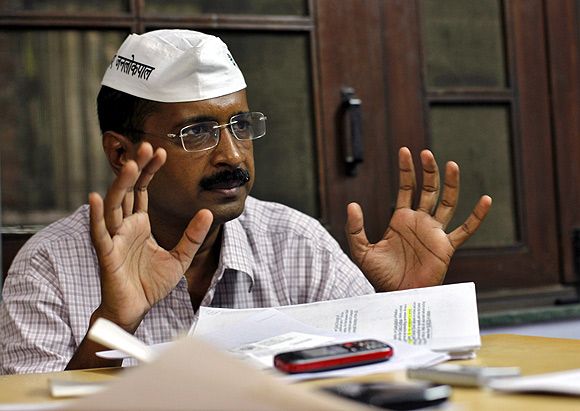 Chief Minister Arvind Kejriwal on Friday accused BSES discoms of trying to "blackmail" the government by threatening power cuts upto 10 hours a day, and warned them of strict action including possible cancellation of licenses.
Chief Minister Arvind Kejriwal on Friday accused BSES discoms of trying to "blackmail" the government by threatening power cuts upto 10 hours a day, and warned them of strict action including possible cancellation of licenses.
The chief minister also said Tatas and Ambanis, who run three electricity distribution firms in Delhi, were not the only companies in the country and government was willing to bring new players.
"There are no reasons for power cuts. I want to give them a warning that if they try to create panic in future, the government will take strict action against them," Kejriwal said as Reliance Infra-backed BSES warned the government of 8-10 hours power cuts a day beginning on Saturday citing fund crunch.
Dismissing any valid reasons for such extreme steps, the chief minister said there were so many question marks over the discoms account.
"They are not cooperating in CAG audit, which raises further suspicion. The government will not keep quite. The government will not hesitate in cancelling their licences," he said while assuring the people that there was no possibility of power cuts.
"Power companies are indulging in wrong doings to create panic they are trying to blackmail us," he said.
Referring to a meeting called by the chief secretary with power companies, Kejriwal said, "We will bring other companies. There are not only two companies in the country.
Companies run by Tata and Ambanis are not the only companies. There are other companies (who can distribute power in Delhi)."
Asking discoms to refrain from the "tactics" being used by the companies to put pressure on Government, Kejriwal assured citizens that no long outages will take place.
"I want to assure Delhi citizens that nothing of that sort will happen," he said.
BSES Yamuna Power Ltd has informed Delhi government that areas in Central and East Delhi may face eight to 10 hours of power cuts from tomorrow as the company was facing serious fund crunch to buy electricity.
In a letter to Delhi's Power Secretary Puneet Goel, BYPL sought immediate financial assistance from the government to deal with the "difficult" situation as it was not being able to make payments to various state-run power generators including NTPC and NHPC.
"In view of non-availability of cost reflective tariff for several years in the past, the revenue gap of BYPL has been mounting year on year. Up to financial year 2011-12, the same was recognised by the Delhi Electricity Regulatory Commission at Rs 2,855 crore," it said.
The company said it no longer has the financial ability or resources to pay the generating companies in full.
The discom said banks have "withdrawn new funding support" owing to accumulated revenue arrears of Rs 6,200 crore and it was finding it difficult to arrange power for the city.
BYPL has sought immediate intervention of Delhi government in helping it overcome the situation and urged it to take up the issue urgently with NTPC, NHPC, Ministry of Power and Ministry of Finance.
The company said banks are "alarmed" by Delhi Government's "subsidy-led" approach to tariffs, regardless of actual cost of power.
The BSES Yamuna Power Ltd and BSES Rajdhani Power Ltd, which supply power in 70 per cent areas in Delhi, owe around Rs 4,000 crore to Delhi Government-run power generation and transmission companies.
Both BRPL and BYPL have been maintaining that they are going through difficult financial condition. They have been demanding significant hike in tariff, citing rise in power purchase cost.






 © 2025
© 2025